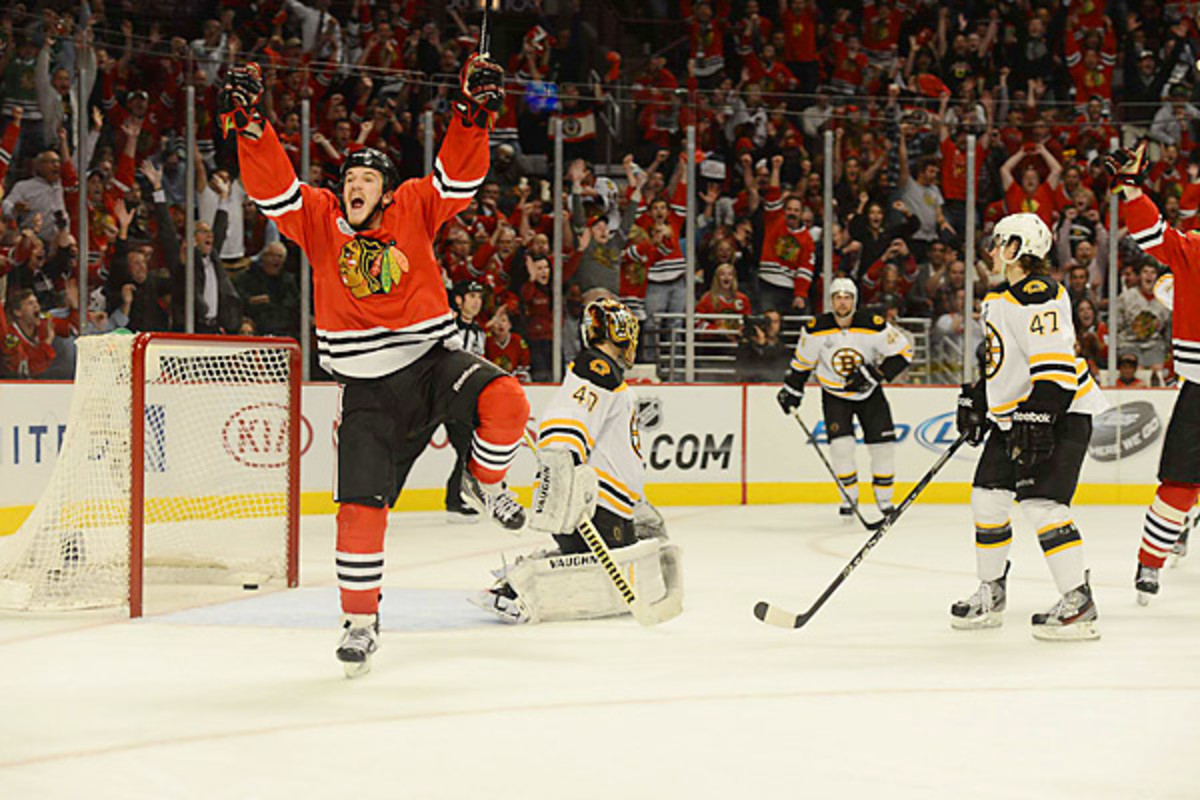Stanley Cup Final: After a draining Game 1, recovery the focus on off-days
Andrew Shaw put in the winning goal in triple overtime on a deflection. (David E. Klutho/SI)
By Sarah Kwak
CHICAGO -- It was the morning-after when he really felt it, Craig Simpson recalled, the time when the toll of a triple-overtime game becomes most apparent to a player's body. By then, the adrenaline had worn off and the extreme fatigue had set in. So, as Simpson recalls, when he finally woke up around 11 or 11:30 a.m. on a Thursday some 13 years ago, he looked down at his hands and saw that they were clenched closed.
“When you play five-and-a-half to six hours, your body just goes through so much, especially dehydration,” Simpson said. “When you’re holding onto a stick for six hours and cross-checking guys hard on the puck, I woke up, thinking, Oh my god, I can hardly open [my hands] up….
“But then my next thought was, ‘Imagine how Ray Bourque must feel.’”
Indeed, on May 15, 1990, Simpson and his Edmonton Oilers were on the right side of the outcome of the longest game in Stanley Cup Final history. After 115 minutes and 13 seconds, Edmonton winger Petr Klima broke the 2-2 deadlock with his fifth goal of the postseason.
On the other side were the Boston Bruins, who on Wednesday night once again found themselves on the short end of a marathon match. Looking back on the 1990 Cup final, Bruins president Cam Neely, Boston’s leading scorer that year, remembers the emotional toll the game took. “[The Oilers] were on a high from winning that game,” he said. “We weren’t.”
In saying so, Neely suggested that the emotional and mental toll of that defeat led to the Bruins’ undoing, as they dropped Game 2 by a score of 7-2 three nights later.
As for this Boston team, which endured 112 minutes and 8 seconds of hockey before a double-deflection goal finally beat their goalie, Tuukka Rask, can it avoid the same fate?
HACKEL: Keys to Cup final Game 2
Said Simpson, now an analyst for the CBC: “On our broadcast [of Game 1 Wednesday night], I said, especially having lived it, I really get a sense that this next goal isn’t necessarily just for tonight’s win, but potentially a two-game win."
Well, the physical effects of Game 1, the Bruins said Thursday afternoon, weren’t so bad. That’s what they said. Though walking around near the team hotel in downtown Chicago, most of Boston’s players nursed water bottles or made sure to have sports drinks in hand. On a day like this, replenishment is the key. Bruins and Blackhawks alike emphasized the importance of eating right and rehydrating today, and all parties expressed great appreciation for the extra day of rest in between games.
“It will help both teams,” Bruins coach Claude Julien said. “It’s probably a blessing in disguise that we have two days between because it’s going to make for a better Game 2.”
But that’s only if Boston can make the emotional bounce-back from defeat. As much as they have to help their muscles and bodies recover, the Bruins have to work even harder at relieving the disappointment that's on their minds. “There’s no room for complaining at this stage,” rookie defenseman Torey Krug said on Thursday. “What actually hurts is playing that amount of time and not getting the result you wanted. It’s tough, but it’s one of those things ... you don’t think about it too much. Just prepare for the next game.”
And on Thursday, the Bruins -- from management to the players -- spoke confidently about their chances. They look at all the emotional stress they have endured during the last two years, and they see reasons to believe that a triple-overtime loss isn’t anything more than “another thing to add to the list,” as center Chris Kelly put it.
When the Bruins won the Stanley Cup in 2011, they came back from 0-2 series deficits twice and played -- and won -- three Game 7s. Earlier in this postseason, they survived one of the most dramatic Game 7s in history, coming back from three goals down with 11 minutes to play and defeating Toronto in overtime. The B's are no strangers to the brink, to emotional days at the rink or away from it. When they hosted their city's first sporting event after the bombings at the Boston Marathon in April, they became a beacon of strength and unity in a time of colossal tragedy. So, if there is a team equipped to do get over a defeat like the one they endured in Game 1, then perhaps these Bruins are it.
“I don’t think much is going to rattle our team,” Julien said. “We’re a pretty resilient group of guys. We live in the moment.”

































